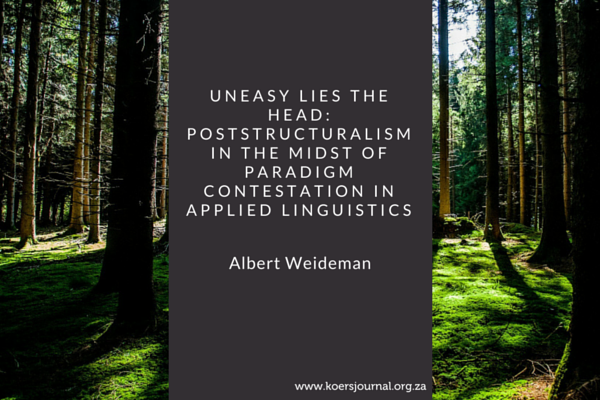Abstract
A number of recent discussions reveal a renewed unease within applied linguistics with how the field should be defined, which direction it should take, what the legitimate focuses are for work in the discipline, what themes should engage applied linguists, and which methodologies they should employ. This paper focuses on how the currently ascendant, late-postmodern paradigm within applied linguistics is dealing with, or ignoring, the challenges it faces from within postmodernism, and beyond. In its response, it is evident that the view of applied linguistics as dealing with language issues or practices makes it difficult to distinguish from linguistics, even where, often contradictorily, its supposed multidisciplinary or interdisciplinary character is invoked. It is essential to distinguish the influence that other disciplines may themselves exert on applied linguistics from the philosophical paradigms operative in those disciplines. Paradigm alignment may therefore well be mistaken for interdisciplinary influence and understandings. Given a current uneasiness with postmodernist approaches, and an expressed desire to move beyond its relativism and political agendas, poststructuralism indeed presents an important theoretical defence of late postmodernism. One problem with that defence is its often strident dismissal of other postmodernist approaches, while implying that it is the purest form of that. So the ascendancy of poststructuralism comes at a cost: the rejection of potential allies. While it may yet contribute to more responsible applied linguistic designs, its emphasis on the political and especially ethical dimensions of applied linguistic work will probably be its enduring contribution. Die ongemak van mag: Poststrukturalisme en die paradigmastryd in die toegepaste taalkundeAbstrak'n Aantal onlangse besprekings gee blyke van hernieude ongemak in die toegepaste taalkunde met betrekking tot hoe die veld gedefinieer behoort te word, watter rigting dit moet inslaan, watter fokusse legitiem is vir sy dissiplinêre werk, watter temas aangespreek moet word, en welke metodologieë aangewend moet word. Hierdie bydrae fokus op die wyse waarop die huidig toonaangewende, laat-postmodernistiese paradigma in die toegepaste taalkunde die uitdagings wat afkomstig is vanuit die postmodernisme self, maar ook van buite die postmodernisme, hanteer of ignoreer. Uit die reaksie daarop is dit duidelik dat die siening van die toegepaste taalkunde as die hantering van taalkwessies of –praktyke dit moelik maak om dit te onderskei van die linguistiek, selfs waar die toegepaste taalkunde ietwat kontradiktories homself tegelyk beroem op sy multi-of interdissiplinêre aard. Dit is verder noodsaaklik om te onderskei tussen die invloed van ander dissiplines op die toegepaste taalkunde en die filosofiese paradigmas wat werksaam is in daardie ander dissiplines. Die belyning van paradigmas oor vakgrense heen kan maklik aangesien word vir interdissiplinêre invloed, wat dit nie is nie. Gegewe die huidige ongemak met 'n postmodernistiese aanpak, asook die versugting om aan te beweeg, weg van sy relativisme en politieke agendas, is dit verstaanbaar dat die poststrukturalisme 'n besondere teoretiese regverdiging mag bied vir die laat-postmodernisme. Die een probleem met daardie verweer is die telkens robuuste afwysing van ander postmodernistiese aanpakke, tesame met die implikasie dat die poststrukturalisme die suiwerste vorm daarvan is. Die invloedrykheid van die poststrukturalisme kom dit dus duur te staan: dit beteken dat potensiële bondgenote verwerp word. Terwyl dit nog kan bydra tot die meer verantwoordelike ontwerp van toegepaste taalkundige intervensies, bly die meer duursame bydrae wat dit kan maak steeds die klem te wees wat dit plaas op veral die politiese en etiese dimensies van toegepaste taalkundige werk._29.png) https://doi.org/10.19108/KOERS.80.4.2247
https://doi.org/10.19108/KOERS.80.4.2247

This work is licensed under a Creative Commons Attribution-NoDerivatives 4.0 International License.
Copyright (c) 2016 Albert Weideman

